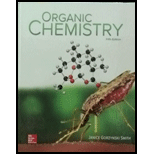
Concept explainers
(a)
Interpretation: The direction of the dipole in each bond and the labeling of atoms with
Concept introduction: A dipole bond is represented by an arrow. The direction of its head is towards more electronegative element and tail is towards electropositive element (less electronegative element).
(b)
Interpretation: The direction of the dipole in each bond and the labeling of atoms with
Concept introduction: A dipole bond is represented by an arrow. The direction of its head is towards more electronegative element and tail is towards electropositive element (less electronegative element).
(c)
Interpretation: The direction of the dipole in each bond and the labeling of atoms with
Concept introduction: A dipole bond is represented by an arrow. The direction of its head is towards more electronegative element and tail is towards electropositive element (less electronegative element).
(d)
Interpretation: The direction of the dipole in each bond and the labeling of atoms with
Concept introduction: A dipole bond is represented by an arrow. The direction of its head is towards more electronegative element and tail is towards electropositive element (less electronegative element).
Want to see the full answer?
Check out a sample textbook solution
Chapter 1 Solutions
Organic Chemistry
- Draw a Lewis structure for each ion. a. CH3O− b. HC2− c. (CH3NH3)+ d. (CH3NH)−arrow_forwardWhich of the following choices represent a pair of resonance forms? .. H Ob. CH 2 CH3 О с.Н H. C -CEN: d. H.arrow_forward1. Which is longer-a C-H bond or a C-O bond? 2. Which is shorter-an N-H bond or a C-H bond? 3. Arrange the following bonds from least polar to most polar: Н-О, H-F, H-N, H-CIarrow_forward
- b. There is one additional resonance structure. NH₂ c. There is a total of five resonance structures (including the original structure). : OHarrow_forwardDraw a second resonance structure for each species in parts (a) and (b). Draw two additional resonance structures for the ion in part (c). ci: a. CH3 C H H I C H CH3 b. H H H c. CH3 :O: :O: II C. || C. I H CH3arrow_forwardFor each of the following bonds, draw a figure indicating the direction of the bond dipole, including which end of the bond is positive and which is negative. а. Р-F с. Р-С b. P-O d. P-H 5.arrow_forward
- Drag the symbol to indicate the correct relationship between the molecules. 4. Bond X-N-X bond angle CH3 H;C `CH3 5. C-O bond polarity 6. Strength of the sp³C-H bond NH H3C° `Cl H3C `Cl Varrow_forwardWhich is the lowest energy resonance structure? a. НО b. HO С. НО а но SH SH SH SHarrow_forwardA. CHF i. Best Lewis Structure B. HNO (H is connected to one of the O's) i. Best Lewis Structure ii. Electron geometry on the C atom ii. Electron geometry on the N atom iii. Approximate bond angles about the C atom iii. Approximate bond angles around the N atom v. Draw the shape with in and out wedges (as necessary) and dipole arrows around the C atom. v. Draw the shape with in and out wedges (as necessary) and dipole arrows around the N atom. vi. Is the molecule polar or nonpolar? vi. Is the molecule polar or nonpolar?arrow_forward
- Lone Pai. ahedral 2. Consider the following Lewis symbols for elements X and Y. a. What are the Group numbers of X and Y? b. Will a compound of X and Y be ionic or molecular? Page 1 of 9 3. For each of the following bonds, indicate the positive end with a and the negative end with a. Draw an arrow to show the dipole for each. а. N—F b. Si-Br с. c. N-P 4. Which of the following bonds are polar? Circle the more electronegative atom in the pairs that are polar. C-O a. b. H Cl (gas) с. 0-O Page 3 of 9arrow_forwardTryptophan is an amino acid found in poultry meats, and is commonly blamed for the sleepy feeling you get after Christmas Dinner. H. H. :N C •C H C-H H. H C H N H. Part A How many sigma (0) bonds are found in tryptophan?arrow_forwardH H- Н Н H:0: НН Н Н H 4-5 H H/ Н нн Н 0: д H Н H H Н d. b. EHO HO(HO HO HO HO HO H H Т нн Н н н нн H H H О н н H H H Hн Н O H H. 'Н Which of the following structures represents the correct Lewis structure for the molecule below? a.arrow_forward
 ChemistryChemistryISBN:9781305957404Author:Steven S. Zumdahl, Susan A. Zumdahl, Donald J. DeCostePublisher:Cengage Learning
ChemistryChemistryISBN:9781305957404Author:Steven S. Zumdahl, Susan A. Zumdahl, Donald J. DeCostePublisher:Cengage Learning ChemistryChemistryISBN:9781259911156Author:Raymond Chang Dr., Jason Overby ProfessorPublisher:McGraw-Hill Education
ChemistryChemistryISBN:9781259911156Author:Raymond Chang Dr., Jason Overby ProfessorPublisher:McGraw-Hill Education Principles of Instrumental AnalysisChemistryISBN:9781305577213Author:Douglas A. Skoog, F. James Holler, Stanley R. CrouchPublisher:Cengage Learning
Principles of Instrumental AnalysisChemistryISBN:9781305577213Author:Douglas A. Skoog, F. James Holler, Stanley R. CrouchPublisher:Cengage Learning Organic ChemistryChemistryISBN:9780078021558Author:Janice Gorzynski Smith Dr.Publisher:McGraw-Hill Education
Organic ChemistryChemistryISBN:9780078021558Author:Janice Gorzynski Smith Dr.Publisher:McGraw-Hill Education Chemistry: Principles and ReactionsChemistryISBN:9781305079373Author:William L. Masterton, Cecile N. HurleyPublisher:Cengage Learning
Chemistry: Principles and ReactionsChemistryISBN:9781305079373Author:William L. Masterton, Cecile N. HurleyPublisher:Cengage Learning Elementary Principles of Chemical Processes, Bind...ChemistryISBN:9781118431221Author:Richard M. Felder, Ronald W. Rousseau, Lisa G. BullardPublisher:WILEY
Elementary Principles of Chemical Processes, Bind...ChemistryISBN:9781118431221Author:Richard M. Felder, Ronald W. Rousseau, Lisa G. BullardPublisher:WILEY





